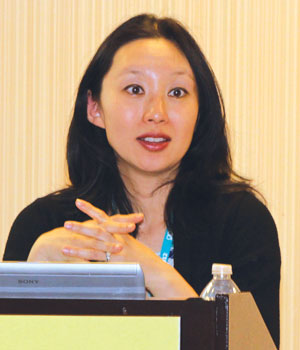Convention Coverage
Romance Vs. STEM

Lora E. Park
For men, pursuing a career in science, technology, and engineering (or STEM) fields is viewed as compatible with being romantically desirable, while for many women, pursuing a STEM career can be viewed as incompatible. Women are earning more PhDs than ever and overt discrimination in STEM workplaces may be a thing of the past, but research suggests that women might be holding themselves back through subconscious acknowledgment of gender norms about intelligence.
For example, college-aged women were shown pictures to prompt them to think about romantic goals (such as a candlelight dinner) or intelligence goals (such as a stack of library books). The women who saw the romance pictures showed less interest in STEM fields than women who saw the intelligence pictures. In a separate study, women who were focused on romantic goals also showed less interest in math.
But these gender norms might also be the key to closing the gender gap.
Female volunteers were shown pictures of women and were told what occupation the woman in the picture had. The volunteers who identified with strongly with their gender group performed better on a math test when they were shown pictures of relatively attractive women who had STEM careers.
The finding raises a problematic question. Would the scientific community really want to encourage women to pursue STEM careers by manipulating how attractive the role models are? The answer is almost certainly “no,” but as this research shows, there is no doubt that norms about romance and intelligence are a piece of the puzzle. Ultimately, these studies need to be expanded to see how women’s preferences are shaped over time and hopefully future findings will not only help close the gap, but eliminate it altogether.
Lora E. Park, University at Buffalo, State University of New York




APS regularly opens certain online articles for discussion on our website. Effective February 2021, you must be a logged-in APS member to post comments. By posting a comment, you agree to our Community Guidelines and the display of your profile information, including your name and affiliation. Any opinions, findings, conclusions, or recommendations present in article comments are those of the writers and do not necessarily reflect the views of APS or the article’s author. For more information, please see our Community Guidelines.
Please login with your APS account to comment.